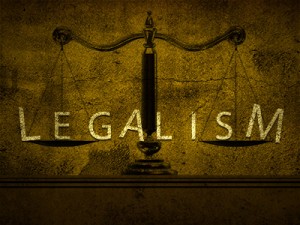
You might be surprised to learn what is the biggest threat to Christianity.
Despite what you might hear from some churches, It’s not gay people.
Despite what you might hear from some politicians pandering for votes, it’s not democrats (or republicans). Not Obama either!
Despite what you might hear from some preachers, it’s not Muslims.
Despite what you might hear from some men, it is not women preachers.
It’s not greed or gluttony. It’s not sports. It’s not Hollywood. It’s not Wall Street. It’s not Russia or China.
No, the biggest threat to Christianity is the one that is probably present in all of the lives and congregations which say the things above, and which Jesus primarily concerned Himself with during His ministry.
The biggest threat to Christianity.
I’ve written on this before, but I’m doing so again because legalism is such a threat that I am firmly convinced that if we had to choose between self-righteous religious legalism and committing sin, we should choose sin every time.
Why? Here are four reasons:
Legalism is the Worst Kind of Sin
 It’s doesn’t look like sin! But at it’s core, legalism fosters pride, arrogance, judgmentalism, and self-righteousness.
It’s doesn’t look like sin! But at it’s core, legalism fosters pride, arrogance, judgmentalism, and self-righteousness.
So in other words, sin is better than legalism because at least sin admits it is sin. Legalism is still sin, but masquerades as righteousness. That makes legalism not only sin, but sinister as well.
Legalism is of the Devil
Literally. Satan is a legalist. We often think that Satan temps us to sin, but I think that sin is only “Plan B” with Satan.
Satan’s primary goal is to turn us into legalists. Rather than turn someone into an outright sinner, Satan would much prefer to have everyone think they are completely obedient to the Laws of God, and are here on earth to get others to obey God also.
Satan wants us to think that because of our obedience to the law of God, we are making God happy. That if we can just conform our lives to a set of rules and behaviors, then we are right with God.
If you gave Satan a choice between an army of religious legalists and an army of Satan-worshiping anarchists, Satan will choose the religious legalists every time. Religious legalists do more damage to the cause of Christ than any anarchist has ever done. Worse yet, religious legalists perform their evil in the name of God, which makes it infinitely more evil.
If you sin, and sin blatantly, at least you will recognize you have sinned, and can fall before God in repentance and confession. God would rather have this than self-righteous, devilish legalism.
Legalists are Far from the Kingdom
Jesus said that tax collects and prostitutes were closer to the Kingdom of God than were the legalistic religious leaders of His day.
The same thing is true today. So called “sinners” know something about themselves and about God which no legalist will ever understand. “Sinners” know that they are sinners and that if God loves and forgives them, it is not because of anything good or Godly in themselves, but is purely out of God’s grace.
Though legalists always pay lip service to grace, they don’t actually believe it. Though they may believe that they were originally saved by God’s love and grace, they believe that God’s continuing love and grace for them is based on their own personal godliness and holy lifestyle.
But since life in the Kingdom of God is based on understanding God’s love and grace, then people who think they are living in the Kingdom according to strict observance of law are not actually living within the Kingdom.
Again, those who the world considered “sinners” know that if they are to be accepted by God, they can depend on nothing but God’s unmerited grace. This is the position in which we should all approach God, but as long as a person thinks they are obeying God, they will never approach God begging for mercy and grace.
 Yes, Jesus said that “Unless your righteousness exceeds that of the Scribes and Pharisees, you will never enter the Kingdom of heaven” (Matthew 5:20). But Jesus was not calling His followers to become more righteous than the scribes and Pharisees. He was saying that when it comes to personal righteousness, you have to be more perfect than the scribes and pharisees, which is impossible! Therefore, don’t even try! Fall upon the grace, mercy, and love of God instead.
Yes, Jesus said that “Unless your righteousness exceeds that of the Scribes and Pharisees, you will never enter the Kingdom of heaven” (Matthew 5:20). But Jesus was not calling His followers to become more righteous than the scribes and Pharisees. He was saying that when it comes to personal righteousness, you have to be more perfect than the scribes and pharisees, which is impossible! Therefore, don’t even try! Fall upon the grace, mercy, and love of God instead.
Legalists Are Blind
The last reason sin is better than legalism is because no legalist ever believes they are a legalist. This is partly what makes this sin so insidious. While most sinners know they are sinners, no legalist ever recognizes their legalism.
Instead, they are “standing up for truth!”, “defending God’s righteousness!”, “calling on people to return to God!”, “living as salt and light!”, or some other such phrase. As such, they are blind to the true condition of their hearts, and believe themselves to be champions of the truth and defenders of the Gospel, but in reality, they are whitewashed tombs, the blind leading the blind.
In a strange turn of events, the sinner who can see God’s ways and God’s love and God’s forgiveness is better off than the legalist. The legalist, seeing only his own self-righteousness, thinks that in order to gain God’s love, everyone needs to be as righteous as he is. The sinner however, knows without a doubt that he can never attain that level of righteousness, and so despairs of ever achieving God’s love. They are left with beating on their chest and saying, “God, be merciful to me, a sinner!” which is what God wants anyway (Luke 18:13).
So how can you know if you are a legalist? Tomorrow I will write about 10 Signs You Might be a Legalist.




 Have you ever heard someone say that God cannot look upon sin? I have, and a reader recently sent in this question:
Have you ever heard someone say that God cannot look upon sin? I have, and a reader recently sent in this question: And if Jesus reveals God to us, then we can assume that God also likes to hang out with sinners and show love to the wicked. To say that God cannot look upon sin is to say that sin can defeat and defile God; that sin is more powerful than the righteous holiness of God! May it never be! God is not so weak and powerless!
And if Jesus reveals God to us, then we can assume that God also likes to hang out with sinners and show love to the wicked. To say that God cannot look upon sin is to say that sin can defeat and defile God; that sin is more powerful than the righteous holiness of God! May it never be! God is not so weak and powerless!
 In a previous post we considered the question, “
In a previous post we considered the question, “ Instead of worrying about a demon behind every corner and whether or not our neighbor exhibits sings of demonic possession, we should be filling our minds with Jesus, focusing our minds on Christ and Him crucified, and praising Him for the victory He has won on the cross over all the principalities and powers. One book that has really helped me see that it is unhealthy (and dangerous) to focus on satanic influences is
Instead of worrying about a demon behind every corner and whether or not our neighbor exhibits sings of demonic possession, we should be filling our minds with Jesus, focusing our minds on Christ and Him crucified, and praising Him for the victory He has won on the cross over all the principalities and powers. One book that has really helped me see that it is unhealthy (and dangerous) to focus on satanic influences is 
 I do not think a Christian can be demon-possessed.
I do not think a Christian can be demon-possessed.
 Frequently, due to sin, rebellion, and the other factors, God simply withdraws His protective hand and allows sin, Satan, and chaos to have their way.
Frequently, due to sin, rebellion, and the other factors, God simply withdraws His protective hand and allows sin, Satan, and chaos to have their way.